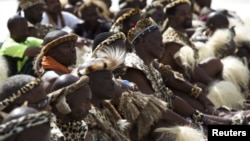A crowd of stick-wielding supporters at a soccer stadium roared their approval as South Africa's Zulu king, Goodwill Zwelithini, insisted he was not behind a wave of violence against migrant workers he had compared a month before to head lice.
His words had been twisted by the media, he said. If he had really given the order for his legions of followers to attack, “this country would be ashes.”
Remarks like those, with the direct threat of violence, have alarmed politicians and activists in South Africa, who say they amount to an open challenge to the post-apartheid order and its elected leadership, from the traditional head of its biggest ethnic group, the 10 million strong Zulu nation.
“This man is laying the basis for a serious contestation that South Africa is going to have,” said Nomboniso Gasa, an expert in traditional law at the University of Cape Town, who was involved in negotiations to end white rule two decades ago.
“He is pushing the boundaries. He has started with the most vulnerable — those who always suffer prejudice — but he's also saying to government and everybody else who is opposed to his absolute authority as a Zulu king: 'You watch it.”'
Finding a role for traditional ethnic chieftains in a large multi-ethnic democracy has been a challenge since the days of apartheid, when white rulers often empowered tribal leaders as an alternative to giving blacks a real stake in state power.
Nelson Mandela struggled with the question of what role to grant the Zulu king and other figures before South Africa's first race-blind election in 1994.
Zwelithini's authority over his followers has now drawn fresh concern since March 20, when he spoke against foreign workers: “Let us pop our head lice,” he said. “We must remove ticks and place them outside in the sun. We ask foreign nationals to pack their belongings and be sent back.”
Since then, at least seven people have been killed in attacks on migrants.
While he has insisted that those remarks were taken out of context and that he opposes violence, his declaration at the Durban soccer stadium last week that he has the power to unleash unrest on an even greater scale caused new alarm. A spokesman for the king did not answer a phone call seeking comment.
Zulu empire
Of all South Africa's ethnic groups, few have an identity as strong as the Zulus, who make up over a fifth of the population.
Central to that identity is King Shaka, the warrior-monarch credited with uniting the Nguni-speaking tribes of eastern South Africa in the early 1800s into a Zulu empire overseen by a brutal and ruthlessly efficient military machine.
Under Shaka and successors such as Dingaan and Cetshwayo, the bravery and loyalty of the spear-carrying impi, or foot soldier, against European colonizers armed with rifles became ingrained in the Zulu psyche.
Those legends endured during apartheid, when most blacks were confined to “homelands,” quasi-autonomous states run by tribal leaders who were in most cases paid by the white-minority government in Pretoria.
When white rule crumbled in the early 1990s, Zulu and other tribal leaders emerged as a potent force bidding for a place in the negotiations to build a new South Africa.
Zwelithini's uncle and mentor, Mangosuthu Buthelezi, took the Zulus to the brink of civil war, with his Inkatha Freedom Party opposing Mandela's African National Congress (ANC) and demanding the king be included in talks on the future. Mandela refused.
“We argued that the king should be above politics, and that if he was included then every tribe in South Africa should be able to send their paramount chief,” he wrote in his 1994 biography, Long Walk to Freedom.
Constitution vs. customs
Nevertheless, the 1996 constitution recognized “the institution, status and role of traditional leadership,” and laws enacted in 2003 and 2004 gave tribal elders sway over issues as vital as land ownership and administration.
Under President Jacob Zuma, a polygamous Zulu traditionalist elected in 2009, the trend has continued, most notably with a Traditional Affairs bill that appears to give tribal chiefs a say in municipal and even provincial government.
Concern grew last year when Zwelithini announced he was launching a formal claim for restitution of vast tracts of ancient Zulu land, including Durban and plots in neighboring provinces owned by other ethnic groups, including white farmers.
Few expect the claim to succeed, but it could give the king more leverage with the ruling ANC, which needs him to ensure it maintains Zulu support in local elections next year.
“For the ANC to control the province, whether they like it or not, they have to work with the king,” said Velaphi Mkhize, a Zulu culture expert at the University of KZN in Durban. “The ANC knows that the king's voice matters the most in this province.”
At a news conference on Wednesday, ANC Deputy Secretary-General Jessie Duarte admitted as much when she declined to condemn Zwelithini's remarks about immigrants.
“In South Africa, the constituencies that have allegiance to traditional leaders react very negatively when you attack their traditional leader,” she said. “We have to be somewhat smarter in our approach.”





